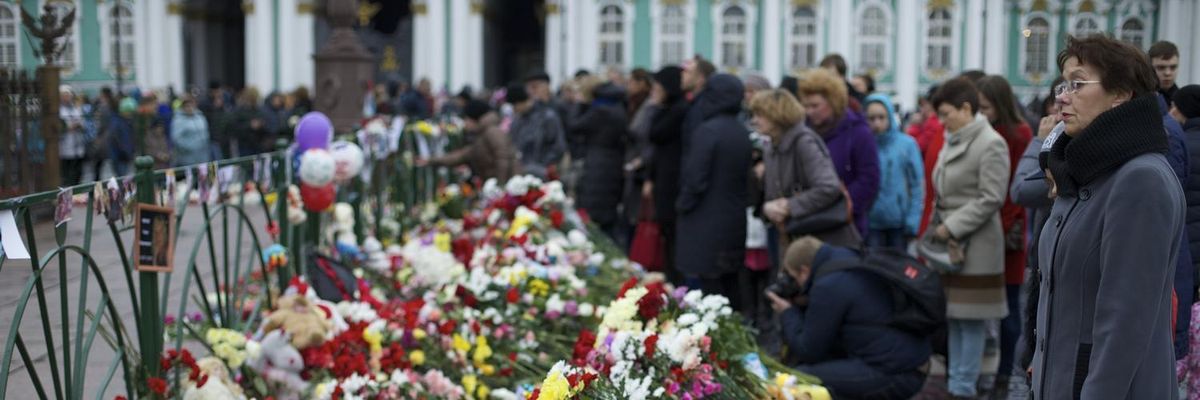Apparently some folks in Beirut couldn't get themselves completely jazzed about the global outpouring of sympathy for Parisians following the ISIS-Daesh attacks there on Friday.
"What about us?" these Beirutis asked. "Are we chopped liver? Don't we have eyes, hands, organs, dimensions, senses, affections, passions? Aren't we fed with the same food, hurt with the same weapons, subject to the same diseases, healed by the same means, warmed and cooled by the same winter and summer, as the Parisians are?"
The New York Timesreports:
Ali Awad, 14, was chopping vegetables when the first bomb struck. Adel Tormous, who would die tackling the second bomber, was sitting at a nearby coffee stand. Khodr Alaa Deen, a registered nurse, was on his way to work his night shift at the teaching hospital of the American University at Beirut, in Lebanon.
All three lost their lives in a double suicide attack in Beirut on Thursday, along with 40 others, and much like the scores who died a day later in Paris, they were killed at random, in a bustling urban area, while going about their normal evening business. [...]
But for some in Beirut, that solidarity was mixed with anguish over the fact that just one of the stricken cities -- Paris -- received a global outpouring of sympathy akin to the one lavished on the United States after the 9/11 attacks. [...]
'When my people died, no country bothered to light up its landmarks in the colors of their flag,' Elie Fares, a Lebanese doctor, wrote on his blog. 'When my people died, they did not send the world into mourning.'
The Times article was particularly striking given that the Times itself -- as the article acknowledged -- had come under fire for minimizing the anti-civilian character of the Beirut attack in its initial reporting.
Taking encouragement from the Times' introspection, perhaps we can now be so bold as to reflect a bit on our reaction to the fate of the 212 Russian passengers, mostly tourists, on board Metrojet Flight 9268, apparently killed by an ISIS bomb on October 31 as they returned from the Sharm el-Sheikh resort in Egypt to Saint Petersburg in Russia. Seventeen were children.
Much more is at stake than our abstract capacity to expand our hearts to accommodate more human suffering. The key to resolving the Syria crisis is making and carrying out a diplomatic deal between the United States and its allies and Russia and its allies about the future of Syria. Indeed, the Washington Postreports:
In Vienna on Saturday, diplomats from the region and from Europe, the United States and Russia agreed to press the various factions they back in Syria's civil war to come together no later than Jan. 1 to begin talks on forming a transitional government.
Once that process starts, participants agreed, they will support a U.N.-monitored cease-fire between forces of President Bashar al-Assad, backed by Russia and Iran, and a wide array of rebel groups variously backed by the United States, Saudi Arabia, Turkey and others.
Now the key to everything -- addressing the threat of terrorism from Syria, addressing the refugee wave from Syria, addressing the carnage in Syria -- is making this deal work. And a key obstacle that this deal faces is that if it works, that will disappoint some people in Washington who wanted to have a decisive victory in Syria over Russia and Iran -- largely, the same political forces who opposed the Iran nuclear agreement. These people have worked to demonize Russia, as they previously worked to demonize Iran, in the belief that they could "keep hope alive" for a decisive victory over Russia in Syria by making the idea of working with Russia politically radioactive.
You don't have to love Russia to acknowledge that we have a common interest with Russia in opposing ISIS, just as you don't have to love Iran to acknowledge that we have a common interest with Iran in opposing ISIS. But in order to understand and support serious diplomacy you do have to see the Russians and Iranians as human beings like us, in both good ways and bad. They're not going to give up what they see as their fundamental interests in Syria if we beat our chests and pound the table, just as we wouldn't give up what we see as our fundamental interests in Saudi Arabia, Bahrain, or Yemen if the Russians and Iranians beat their chests and pounded the table. Insisting on being in denial about this is just a prescription for more carnage.
So, it would be a salutary exercise to prepare for the political struggle ahead to acknowledge the humanity of the Russians, who also have eyes, hands, senses, affections, and passions, who also cry when their children don't come home safe from trips abroad. If you agree that people in Washington should more forthrightly acknowledge that Russia is also threatened by ISIS terror, and that our diplomatic engagement should reflect this acknowledgment, you can tell them so here.
